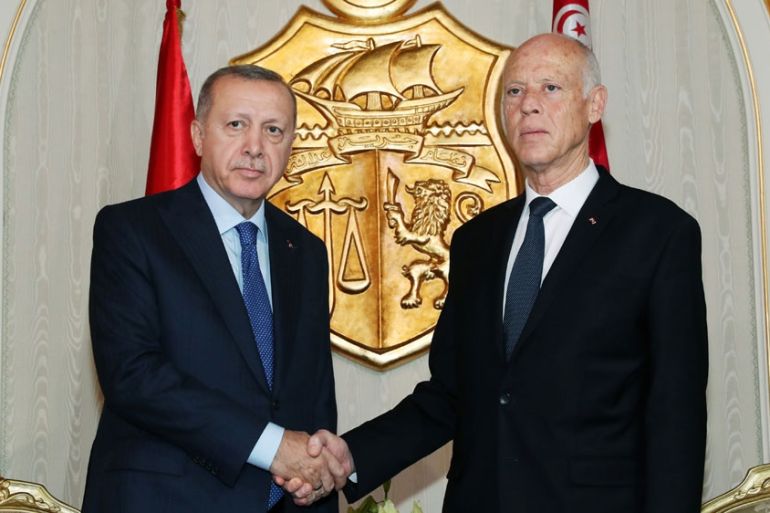Turkey’s Erdogan makes surprise visit to Tunisia to discuss Libya
Turkish leader says the visit was aimed at finding ways to establish ‘a ceasefire as soon as possible’.

Turkish President Recep Tayyip Erdogan on Wednesday met with his Tunisian counterpart, Kais Saied, during a surprise visit to the Tunisian capital to discuss developments in neighbouring Libya.
Speaking during a joint news conference, Erdogan told reporters that they discussed ways of establishing a ceasefire and bringing warring factions back to the negotiating table.
Keep reading
list of 3 itemsLibya’s Haftar announces ‘decisive battle’ to capture Tripoli
Turkish parliament ratifies security deal with Libya: State media
“We discussed the possible steps we can take and cooperation opportunities with the aim of establishing a ceasefire in Libya as soon as possible and returning to a political process,” Erdogan said.
The visit comes a month after Turkey and Libya’s UN-recognised Government of National Accord (GNA) signed a memorandum of understanding on security and military cooperation.
The GNA’s cabinet of ministers and Turkish legislators have since approved the deal.
In his comments on Wednesday, Erdogan reiterated Turkey’s willingness to send troops to support the GNA, saying it would do so at the Libyan government’s request.
“We are not guests without an invitation and if it comes, we shall look into it,” Erdogan said. “We are in constant communication with them,” he said.
“However, we should raise an issue: the forces present in Libya, more than 5,000 troops from Sudan, what are they doing there,” asked Erdogan, referring to reports of Sudanese fighters battling alongside troops loyal to renegade military commander Khalifa Haftar.
The form of Turkey’s military assistance remains unclear but Ibrahim Kalin, Erdogan’s spokesperson, on Tuesday said Turkey’s parliament was working on a draft bill to allow troop deployment to Libya.
Rival administrations
Libya has been in turmoil since 2011 when a NATO-backed uprising toppled longtime ruler Muammar Gaddafi.
The country has been split into rival eastern and western administrations since 2014, with the GNA, led by Prime Minister Fayez al-Sarraj, currently controlling Tripoli, situated in northwestern Libya, and a parallel administration holding the east of the oil-rich country, supported by Haftar’s self-styled Libyan National Army (LNA).
Since early April, Haftar waged a months-long military campaign against the GNA, which he accuses of harbouring “terrorist elements”.
Russia, the United Arab Emirates (UAE), Saudi Arabia, Egypt and, to a lesser extent, France, support Haftar.
|
|
Russia buy-in
US media reported in September that hundreds of mercenaries from the Russian Wagner group – owned by a close confidante of President Vladimir Putin – were assisting Haftar’s forces outside Tripoli.
Analysts say this means Erdogan needs Russia’s buy-in to proceed with any military deployment.
Sami Hamdi, editor-in-chief of the International Interest magazine, said the timing of Erdogan’s trip to Tunisia, just days after a senior Turkish delegation visited Moscow suggests that Turkey has Russia’s implicit approval.
“Russia has implied that it’s ready to entertain the prospect of mediation. Turkey doesn’t want actually want to send troops, it prefers the idea of mediation,” Hamdi said.
“If we [are] following this line of thought, then we would assume that the Libyan parties would not want to go to Moscow for talks because they [GNA] believe Moscow is backing Haftar and the parties that back Haftar won’t go to Ankara or Turkey to discuss talks.”
Hamdi said this makes Tunisia the “perfect middle ground” given its proximity and the fact that it backs neither of the warring parties.
Emad Badi, a non-resident fellow with the Middle East Institute, said it is possible for Russia to temper its support for Haftar because its goals were not necessarily tied to the commander’s survival.
“Russia is backing him [Haftar] because it can potentially sow discord within EU and NATO. The posturing also threatens the US as well,” Badi said.
“And all of it also aligns with the theory that Libya is unstable as a result of Western intervention – which is their favourite line. So the question is whether they can still do much of the above while not back him and the answer is probably yes,” he added.